EENGLISH
�
FCC STATEMENT
This device complies with Part 15 of the FCC Rules. Operation is subject to
the following two conditions:
(1) This device may not cause harmful interference, and
(2) This device must accept any interference received, including interference
that may cause undesired operation.
Note:
This equipment has been tested and found to comply with the limits for Class B digital
devices, pursuant to Part 15 of the FCC rules. These limits are designed to provide
reasonable protection against harmful interference in a residential installation. This
equipment generates, uses and can radiate radio frequency energy and, if not
installed and used in accordance with the instructions, may cause harmful interference
to radio communications. However, there is no guarantee that interference will not
occur in a particular installation. If this equipment does cause harmful interference to
radio or television reception, which can be determined by turning the equipment off
and on, the user is encouraged to try to correct the interference by one or more of the
following measures:
Reorient or relocate the receiving antenna
Increase the separation between the equipment and receiver
Connect the equipment into an outlet on a circuit different from that to
which the receiver is connected
Consult the dealer or an experienced radio/TV technician for help
Use of shielded cable is required to comply with Class B limits in Subpart B of
Part 15 of the FCC rules. Do not make any changes or modifications to the
equipment unless otherwise specified in the manual. If such changes or
modifications should be made, you could be required to stop operation of the
equipment.
i
D
g
i
t
a
l
C
a
m
e
r
a
>
>
2-E
�
U
s
e
r
’
s
M
a
n
u
a
l
>
>
TRADEMARK INFORMATION
Microsoft® and Windows® are U.S. registered trademarks of Microsoft
Corporation.
Pentium® is a registered trademark of Intel Corporation.
Macintosh is a trademark of Apple Computer, Inc.
SDTM is a trademark.
Other names and products may be trademarks or registered trademarks
of their respective owners.
READ THIS FIRST
Notice:
1. Product design and specifications are subject to change without notice.
This includes primary product specifications, software, software drivers
and user’s manuals. This User Manual is a general reference guide for the
product.
2. The illustrations in this manual are for the purpose of explanation and may
differ from the actual design of your camera
3. The manufacturer assumes no liability for any errors or discrepancies in this
user manual.
4. For driver updates, refer to our website.
E-3
�
Safety Instructions
Read and understand all Warnings and Cautions before using this product
WARNING
If foreign objects or water have entered the camera, turn the
power OFF and remove the battery and the AC power adapter
Continued use in this state might cause fire or electric shock. Contact our
hotline.
If the camera has fallen or its case has been damaged, turn the
power OFF and remove the battery and the AC power adapter.
Continued use in this state might cause fire or electric shock. Contact our
hotline.
Do not disassemble, change or repair the camera.
This might cause fire or electric shock. For repair or internal inspection,
contact our hotline.
Use the supplied AC adapter only with the indicated power
supply voltage.
Use with any other power supply voltage might cause fire or electric
shock.
Do not use the camera in areas near water.
This might cause fire or electric shock. Take special care during rain,
snow, on the beach or near the shore.
Do not place the camera on inclined or unstable surfaces.
This might cause the camera to fall or tilt over, causing damage.
Keep the battery out of the reach of children.
Swallowing the battery may cause poisoning. If the battery is accidentally
swallowed, immediately consult a doctor
Do not use the camera while you are walking, driving or riding
a motorcycle.
This might cause you to fall over or result in traffic accident.
i
D
g
i
t
a
l
C
a
m
e
r
a
>
>
4-E
�
CAUTION
Insert the battery paying careful attention to the polarity (+ or -) of
the terminals.
Inserting the battery with its polarities inverted might cause fire and injury,
or damage to the surrounding areas due to the battery rupturing or leak-
ing.
Do not fire the flash close to anyone’s eyes.
This might cause damage to the person’s eyesight.
Do not subject the LCD monitor to impact.
This might damage the glass on the screen or cause the internal fluid
to leak. If the internal fluid enters your eyes or comes into contact with
your body or clothes, rinse with fresh water. If the internal fluid enters
your eyes, consult a doctor for immediate treatment.
A camera is a precision instrument. Do not drop it, strike it or
use excessive force when handling the camera.
This might cause damage to the camera.
Do not use the camera in humid, steamy, smoky or dusty
places.
This might cause fire or electric shock.
Do not remove the battery immediately after long period of
continuous use.
The battery becomes hot during use. Touching a hot battery might
cause burns.
Do not cover the camera with any material.
This might cause heat to build up and deform the case, resulting in fire.
Use the camera in a well-ventilated place.
Do not leave the camera in places where the temperature may
rise significantly, such as inside a car.
This might adversely affect the case or the parts inside, resulting in
fire.
Before you move the camera, disconnect cords and cables.
Failure to do this might damage cords and cables, resulting in fire and
electric shock.
U
s
e
r
’
s
M
a
n
u
a
l
>
>
E-5
�
i
D
g
i
t
a
l
C
a
m
e
r
a
>
>
Notes on Battery Usage
When you use the battery, carefully read and strictly observe the Safety
Instructions and the notes described below:
Different types of batteries may have different battery performance.
Avoid using batteries in extremely cold environments as low temperatures
can shorten the battery life and reduce camera performance.
If you are using the new rechargeable batteries or rechargeable batteries that
have not been used for an extended period of time (batteries that pass the
expiry date are exceptions), this might affect the number of pictures that can
be taken. Therefore, to maximize their performance and lifetime, we
recommend that you fully charge the batteries and discharge them for at
least one complete cycle before use.
The battery may feel warm when using the camera for an extended period
of time or using the flash continuously. This is normal and not a malfunction.
The camera may feel warm when being used continuously or for an
extended period of time. This is normal and not a malfunction.
If you do not intend using the batteries for an extended period of time,
remove them from the camera to prevent leakage or corrosion.
Always keep the terminals in a clean state.
Do not use a battery other than that specified for use with your camera.
Use of an unsuitable battery may result in the battery splitting, or leaking
and may cause a fire, injury or soiling of the battery compartment.
6-E
�
CONTENTS
9 INTRODUCTION
9
11
Overview
Package Contents
12 GETTING TO KNOW THE CAMERA
12
13
14
15
16
17
Front View
Rear View
SET/Direction Button
Mode Dial
Viewfinder LED Indicator
LCD Monitor Icons
20 GETTING STARTED
20
20
22
24
25
26
27
28
29
Attaching the Camera Strap
Inserting and Removing the Battery
Charging the Battery
Inserting and Removing the SD Card
Turning the Power On/Off
Formatting the SD Card
Choosing the Language
Setting the Date and Time
Setting Image Resolution and Quality
32 PHOTOGRAPHY MODE
32
34
35
36
38
40
42
43
44
46
47
48
49
] Auto Photography Mode
[
Using the Optical Zoom
Using the Digital Zoom
Setting the Flash
Setting the Focus
Self-timer/Photographing at Intervals
Exposure Compensation/Backlight Correction
[ P ] Program (Automatic Exposure) Photography Mode
[ Tv ] Shutter Speed Priority Photography Mode
[ Av ] Aperture Priority Photography Mode
[ M ] Manual Photography Mode
Setting the Scene Mode
[
] Movie Mode
U
s
e
r
’
s
M
a
n
u
a
l
>
>
E-7
�
i
D
g
i
t
a
l
C
a
m
e
r
a
>
>
50 [
50
52
54
55
56
57
58
59
61
63
] PLAYBACK MODE
Playing Back Still Images
Playing Back Video Clips
Playing Back Still Images/Video Clips on a TV
Recording Voice Memos
Thumbnail Display
Zoom Playback
Slideshow Display
Protecting Images
DPOF Settings
[
] Erasing Images
65 MENU OPTIONS
65
67
70
72
73
75
Photography Menu (Picture)
Photography Menu (Function)
Photography Menu (AE/AWB)
Playback Menu
Setup Menu (Basic)
Setup Menu (Custom)
77 TRANSFERRING RECORDED IMAGES/VIDEO CLIPS TO YOUR
COMPUTER
78
79
80
Step 1: Installing the USB Driver on a Windows PC
Step 2: Connecting the Camera to Your Computer
Step 3: Downloading Images/Video Clips
81 Installing PhotoSuite
82 Installing PhotoVista
83 CONNECTING THE CAMERA TO OTHER DEVICES
84 CAMERA SPECIFICATIONS
8-E
�
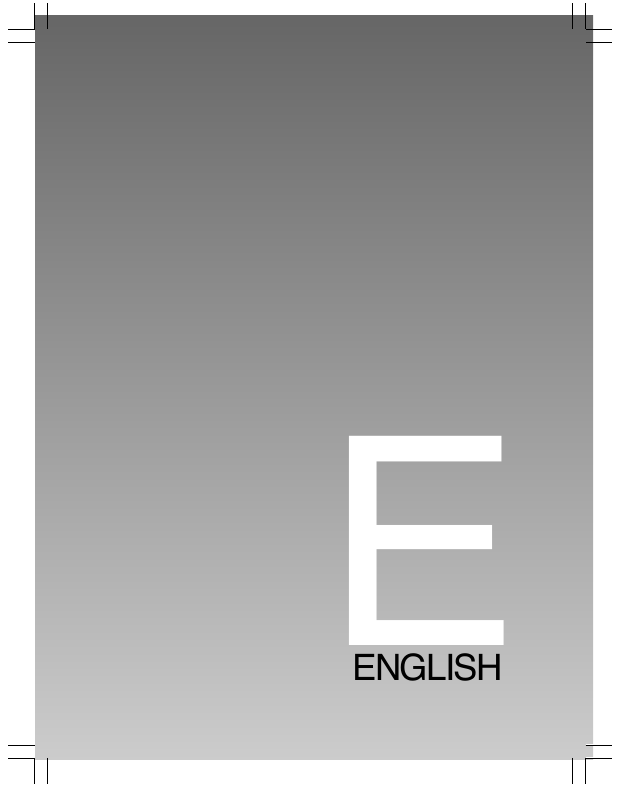
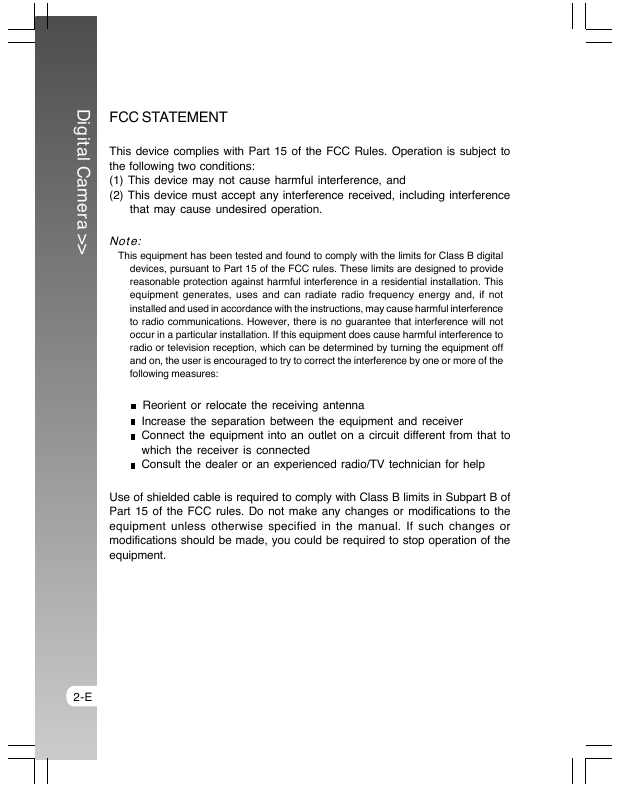
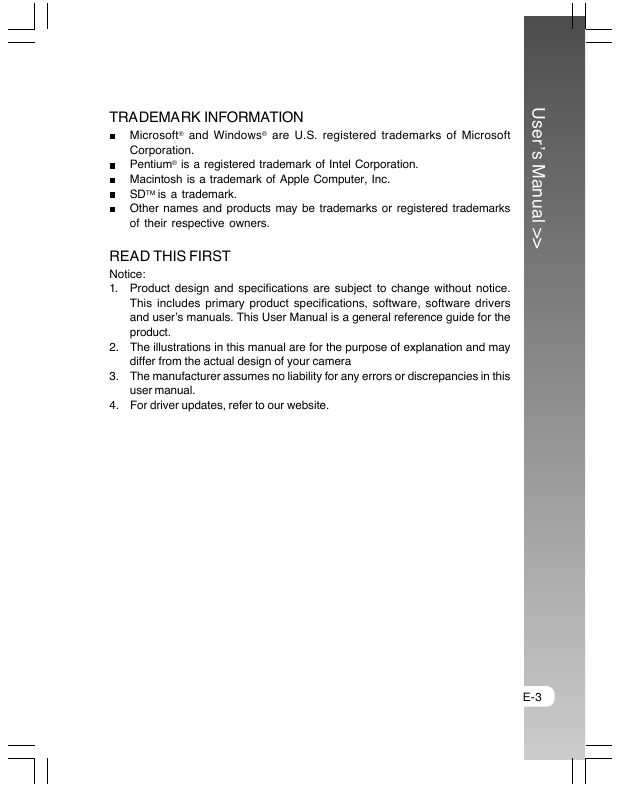

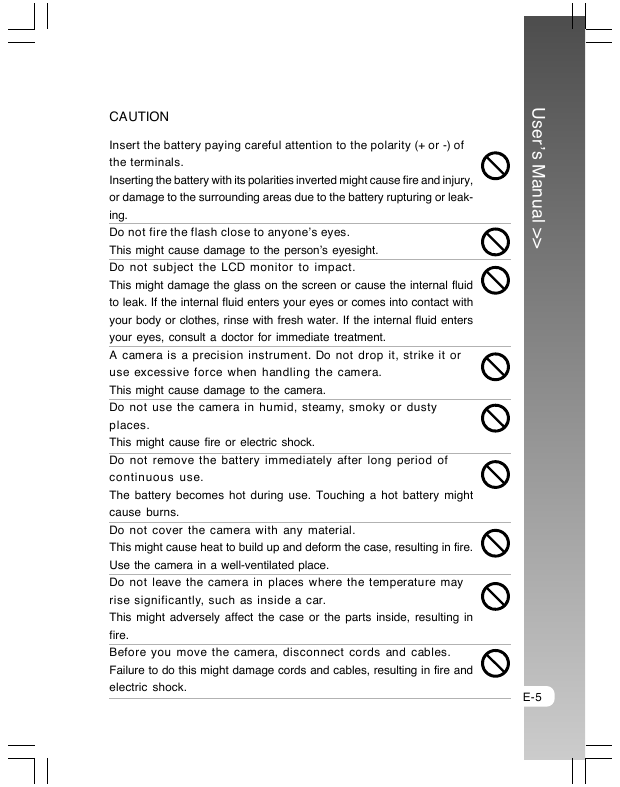
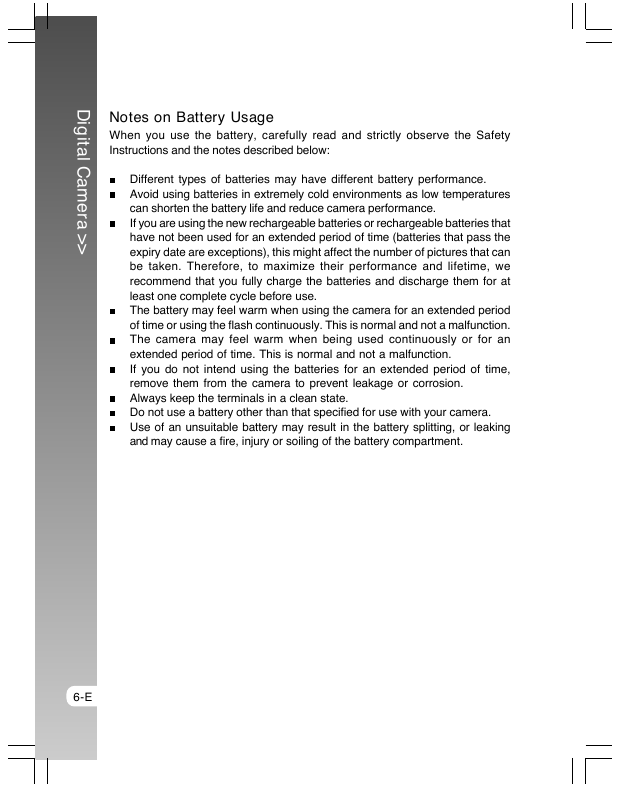
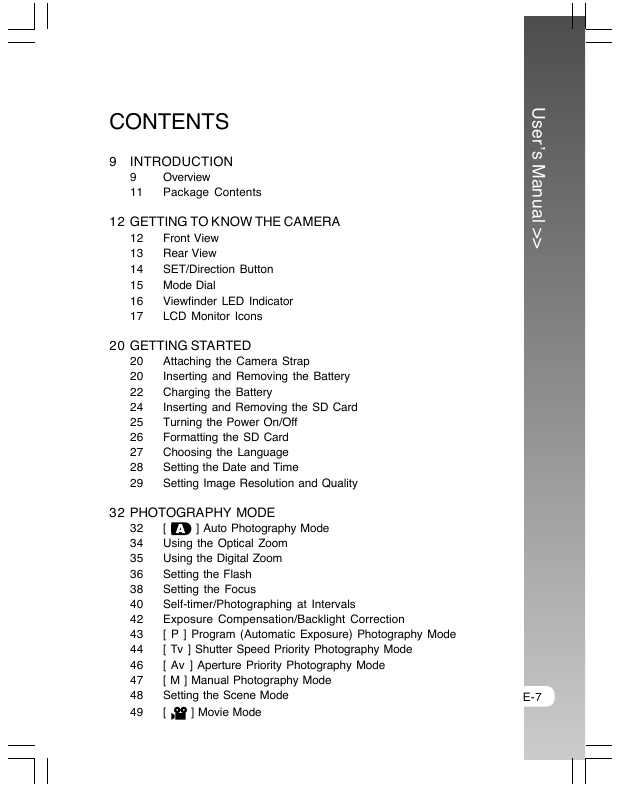
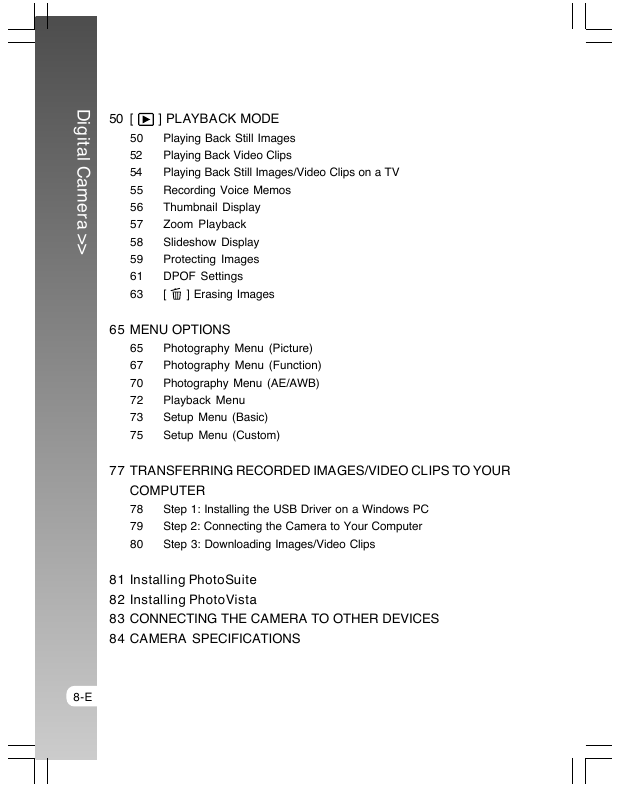








 2023年江西萍乡中考道德与法治真题及答案.doc
2023年江西萍乡中考道德与法治真题及答案.doc 2012年重庆南川中考生物真题及答案.doc
2012年重庆南川中考生物真题及答案.doc 2013年江西师范大学地理学综合及文艺理论基础考研真题.doc
2013年江西师范大学地理学综合及文艺理论基础考研真题.doc 2020年四川甘孜小升初语文真题及答案I卷.doc
2020年四川甘孜小升初语文真题及答案I卷.doc 2020年注册岩土工程师专业基础考试真题及答案.doc
2020年注册岩土工程师专业基础考试真题及答案.doc 2023-2024学年福建省厦门市九年级上学期数学月考试题及答案.doc
2023-2024学年福建省厦门市九年级上学期数学月考试题及答案.doc 2021-2022学年辽宁省沈阳市大东区九年级上学期语文期末试题及答案.doc
2021-2022学年辽宁省沈阳市大东区九年级上学期语文期末试题及答案.doc 2022-2023学年北京东城区初三第一学期物理期末试卷及答案.doc
2022-2023学年北京东城区初三第一学期物理期末试卷及答案.doc 2018上半年江西教师资格初中地理学科知识与教学能力真题及答案.doc
2018上半年江西教师资格初中地理学科知识与教学能力真题及答案.doc 2012年河北国家公务员申论考试真题及答案-省级.doc
2012年河北国家公务员申论考试真题及答案-省级.doc 2020-2021学年江苏省扬州市江都区邵樊片九年级上学期数学第一次质量检测试题及答案.doc
2020-2021学年江苏省扬州市江都区邵樊片九年级上学期数学第一次质量检测试题及答案.doc 2022下半年黑龙江教师资格证中学综合素质真题及答案.doc
2022下半年黑龙江教师资格证中学综合素质真题及答案.doc